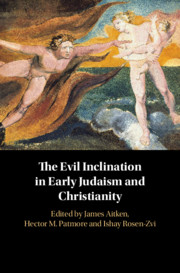Book contents
- The Evil Inclination in Early Judaism and Christianity
- The Evil Inclination in Early Judaism and Christianity
- Copyright page
- Contents
- Acknowledgments
- Contributors
- 1 Introduction
- 2 Reconsidering the Semantics of the “Inclination” (yeṣer) in Classical Biblical Hebrew
- 3 The “Inclination” (yeṣer) as Rendered in the Septuagint
- 4 “Fleshly Spirit” and “Vessel of Flesh” in 4QInstruction and the Thanksgiving Hymns
- 5 Theological Anthropology in the Enochic Tradition
- 6 The Perils of Philosophical Persuasion: Philo on the Origin of Moral Evils
- 7 The Evil Inclination (yeṣer ha-ra‘) in Tannaitic Literature: Demonic Desires and Beyond
- 8 Conflicting Intrapersonal Powers in Paul’s Letters
- 9 The “Two Inclinations” and the Double-Minded Human Condition in the Letter of James
- 10 An Evil Inclination in the Early Targums to the Pentateuch and Prophets?
- 11 “Gnostic” Theologies of Evil
- 12 The Rabbinic “Inclination” (yeṣer) and the Christian Apocrypha
- 13 Origen on the Origin of Sin
- 14 Augustine on the Diabolical Suggestion of Sin
- 15 Jerome and the “Inclination” (yeṣer): The Evidence of the Vulgate
- 16 Rabbinic Inclinations and Monastic Thoughts: Evagrius Ponticus’ Doctrine of Reasoning (logismoi) and Its Antecedents
- 17 “Inclination” (yaṣrā) in the Syriac Tradition
- 18 Evil, Sin, and Inclination (yeṣer) in Jewish and Christian Poetic Disputes between the Body and Soul
- 19 The Wizard of Āz and the Evil Inclination: The Babylonian Rabbinic Inclination (yeṣer) in Its Zoroastrian and Manichean Context
- 20 The Evil Inclination in the Targums to the Writings
- References
- Index of Names
- Index Locorum
6 - The Perils of Philosophical Persuasion: Philo on the Origin of Moral Evils
Published online by Cambridge University Press: 02 February 2021
- The Evil Inclination in Early Judaism and Christianity
- The Evil Inclination in Early Judaism and Christianity
- Copyright page
- Contents
- Acknowledgments
- Contributors
- 1 Introduction
- 2 Reconsidering the Semantics of the “Inclination” (yeṣer) in Classical Biblical Hebrew
- 3 The “Inclination” (yeṣer) as Rendered in the Septuagint
- 4 “Fleshly Spirit” and “Vessel of Flesh” in 4QInstruction and the Thanksgiving Hymns
- 5 Theological Anthropology in the Enochic Tradition
- 6 The Perils of Philosophical Persuasion: Philo on the Origin of Moral Evils
- 7 The Evil Inclination (yeṣer ha-ra‘) in Tannaitic Literature: Demonic Desires and Beyond
- 8 Conflicting Intrapersonal Powers in Paul’s Letters
- 9 The “Two Inclinations” and the Double-Minded Human Condition in the Letter of James
- 10 An Evil Inclination in the Early Targums to the Pentateuch and Prophets?
- 11 “Gnostic” Theologies of Evil
- 12 The Rabbinic “Inclination” (yeṣer) and the Christian Apocrypha
- 13 Origen on the Origin of Sin
- 14 Augustine on the Diabolical Suggestion of Sin
- 15 Jerome and the “Inclination” (yeṣer): The Evidence of the Vulgate
- 16 Rabbinic Inclinations and Monastic Thoughts: Evagrius Ponticus’ Doctrine of Reasoning (logismoi) and Its Antecedents
- 17 “Inclination” (yaṣrā) in the Syriac Tradition
- 18 Evil, Sin, and Inclination (yeṣer) in Jewish and Christian Poetic Disputes between the Body and Soul
- 19 The Wizard of Āz and the Evil Inclination: The Babylonian Rabbinic Inclination (yeṣer) in Its Zoroastrian and Manichean Context
- 20 The Evil Inclination in the Targums to the Writings
- References
- Index of Names
- Index Locorum
Summary
When raising the question of the origin of evil, we first need to distinguish between two meanings of the term. Evil can refer to phenomena such as diseases, earthquakes, natural disasters, and the like, or it can refer to “moral evils” – that is, to humanity’s wrongdoings, improper conduct, or vices. Since the concept of an Evil Inclination, as defined by the editors of this volume, relates to moral agents and not to a bad state of affairs, it undoubtedly fits into the second category. This does not mean that Philo did not attempt to deal with natural evils. In two of his philosophical treatises –both entitled On Providence – he addresses this issue in connection with the question of theodicy.
- Type
- Chapter
- Information
- The Evil Inclination in Early Judaism and Christianity , pp. 95 - 114Publisher: Cambridge University PressPrint publication year: 2021

